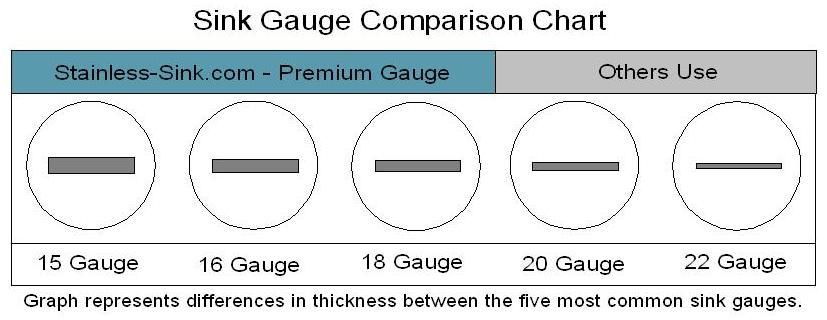When looking at different sinks, you need to know some basic information about the materials that are used to make these sinks. When you are not sure what materials are best, you can easily be taken in by sink suppliers that are not offering quality sinks. It is easy to say that your sink is of the right quality, but that is only lip service if the right materials have not been used to create the sink.
Knowing about the gauges of the steel used to make a sink is important for your buying process. You will need to be sure that you are educated about this important detail before you start selecting products and make essential mistakes.
If you are ready to learn some more about what 16-gauge stainless steel sinks are, you need to keep reading.
What Is Meant By the Gauge of the Sink?
The gauge of the sinks that you are looking at does not refer to the design of the sink in any way other than the thickness of the material that is used to make it. When you are looking at 16-gauge sinks, you are looking at sinks with this thickness of stainless steel.

Home use sinks need to be at least 16-gauge but can also be 18-gauge. The 16-gauge category is considered a luxury sink, but this is the best thickness of material that you can have for long-term performance and lifespan. Sinks that are made with this thickness of the material will be able to hold up to lots of use without getting scratched, dented, or damaged through normal use.
The decimal inch that 16-gauge steel reflects is 0.0625. This is 1.5875 millimeters in thickness. 16-gauge steel is 25% thicker than lower-quality sink materials, and this helps with dent resistance and noise dampening. This means that the kitchen will be quieter with a 16-gauge sink in place, as well as being supported by the benefits of the resilience of the material itself.
Why is Lower Gauge Material Better?
The higher the gauge of the sink material, the thinner and less sturdy it will be. This is the primary reason a lower gauge stainless steel is always the best for your needs. Premium gauges are lower in number because they are made to resist scratches and dents and to be capable of improved durability when exposed to caustic liquids as well.

A thicker sink material is not the only qualifier for a quality sink, but it does go a long way toward making sure that you will get the right sink for your needs. The difference between higher gauges and a lower gauge like a 16-gauge sink is significant, and you will want to make this your ideal sink selection. This helps to weed out lower-quality sinks that are mass-produced, and that will not hold up to as much use or provide as nice a user experience.
Is an 18-Gauge Sink Better?
While it is true that the lower the gauge number, the better the sink quality, there are some reasons why you might not want to get an 18-gauge sink. There is not much of a difference between these two gauges, and if you are going to pay more for the 18-gauge sink, there is no reason to make the change to the slightly thicker material. The difference between these two gauges is a difference of 0.0625 inches which is not much and probably not worth the added cost.
A 16-gauge sink is also the standard for most projects, so it can be a good idea to get the sink product that you were originally aiming for and not one that is just slightly thicker. While you might get added durability from this increased thickness, there is not likely to be much return on changing your plans and getting a thicker sink. You might also spend slightly more on shipping the 18-gauge sink, which makes it a wise choice financially to stick with the standard 16-gauge sink material.
Is There a Difference in Design for 16-Gauge Sinks?
In some cases, when dealing with some manufacturers, the line between a lower-quality sink and a 16-gauge sink does bring additional perks. You might get a better-formed sink with a nicer shape to it, and you will likely also get the benefit of improved sound dampening and padding on the underside of the sink.

There is a significant industry difference in quality between 16-gauge sinks and other kinds of sinks that are on offer, and this is one of the key reasons that you should spend slightly more money for a truly durable sink. Getting a nice product that will hold up to shipping and also provide a much nicer finished product for your needs is important. Most people can immediately tell the difference between a 16-gauge sink and a cheaper one, so there is no reason to go with a cheap option that does not hold up to expectations.
A 16-Gauge Sink is a Right Choice for Many Reasons
There are so many reasons that you will want to pick a stainless steel sink for your needs. These are the best quality standard sinks that you can get on the market, and they are affordable to buy and affordable to ship. You can also count on the quality and the design of these sinks and be sure that you will get a product that can be used for various purposes without damage.
16-gauge sinks are far superior to other gauges of sink material, and they are made to be quieter to use and to resist denting scuffs and damage from acidic or caustic liquids. This makes a 16-gauge sink a great choice for a kitchen sink, but they can be used for other applications as well. This is the luxury sink standard for a reason, and this kind of sink provides the most bang for your buck when you are sink shopping.










